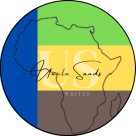The Performance of Allyship
Every time South Africans take to the streets against gender-based violence and femicide, I can’t help but think back to the 2018 Total Shutdown march, and how women and gender nonconforming people explicitly asked men not to attend… But, as is usually the case in our morally depraved society, entitlement won. Some men ignored that plea and forced themselves into a space that was never theirs to occupy, convinced that this was an act of solidarity. It wasn’t.
It was another stark reminder of how men, even in moments of crisis, centre themselves.
Fast forward to today, and I see men marching again. The same men who rape infants, teenagers, mothers, and grandmothers. The same men who catcall schoolgirls and beat their partners to a pulp behind closed doors. The same men who control the entire criminal justice system — the police, the courts, the legislature — the very system that enables this violence. The same men who maintain an iron grip over the economy through patriarchy, the ones who could actually do something if they wanted to. However, instead of wielding their power to “pour sand in the gears of the machine,” they choose performative allyship. They march. They chant. They cry crocodile tears for the very same survivors they create. #JusticeForCweCwe rings hollow. The truth is there’s a time for protest and a time for action, and this moment demands more than empty rhetoric; it demands a real shift in power dynamics to create substantive change that lasts.
The Domestic Violence Act, though significant, is not enough. Laws mean nothing when enforcement is selective, biased, or simply non-existent. We need independent oversight bodies with actual powers to investigate and penalise inaction (and corruption) in GBV cases. The police, both men and women, fail survivors daily, and an external body with real authority would be able to hold them accountable. We need mandatory state intervention policies, similar to those in Sweden, where the justice system treats domestic violence as a state issue rather than a private (civil) matter. In Sweden, the police are required to intervene and investigate even if the victim does not file charges. Such a change would help survivors in South Africa feel less isolated and burdened, which could reduce the fear of retaliation and secondary victimisation. We need expanded legal protections to ensure restraining and protection orders are effectively enforced, with immediate consequences for non-compliance. There are numerous cases of women being repeatedly abused by people they have existing protection orders against, only for the system to fail them again. These measures must go hand-in-hand with the retraining of our police men and women to ensure proper enforcement and a more survivor-centred response.
Men control the economy — the corporations, wages, resources. If they refuse to use that power to end gender-based violence voluntarily, they must be compelled. This can be achieved by offering tax incentives for companies that fund women’s shelters, provide free legal services to survivors, or create rehabilitation programmes for abusers. Impose heavy penalties on corporations that fail to implement gender-based violence policies or support survivors within their workforce. There must be a zero-tolerance policy for voyeuristic bystanders. We must be intentional about funding women-led grassroots initiatives that bypass patriarchal gatekeepers and put money directly into the hands of those working to end GBV on the ground.
Ending gender-based violence also requires a fundamental shift in narratives and the systems that uphold them. The entitlement that fuels GBV isn’t biological, it’s taught. It’s in the way schools reinforce gender roles, the way media normalises male aggression, the way religion preaches female submission. These narratives must be disrupted before they become deeply entrenched. Schools must overhaul curricula to include comprehensive education on gender, consent, and power dynamics from an early age (not merely ‘sex-ed’). The media must reform its representation of masculinity and femininity, dismantling the glorification of toxic male aggression and ending the “Sarah Baartmanification” (the hypersexualisation and exploitation of Black women’s bodies) of South African women and teenage girls. Religious and cultural institutions must also be held accountable for the role they play in shaping attitudes towards gender and power, as well as their tendency to protect predators. Patriarchy in this country can never be separated from its historical entanglement with Christian Calvinism.
Marching, chanting, and catchy hashtags won’t break the back of a system that thrives on women’s subjugation. As Dr Claud Anderson reminds us: “We’ve been marching for 150 years and haven’t moved an inch.” The issue isn’t just about “raising awareness” — we’ve been aware!
Real change means dismantling the systems that enable and shield abusers, redistributing power and resources, and demanding accountability at every level of society. No more crocodile tears. No more performative activism.
Action. Now.
Peace and Black Power ❤ 🖤 💚
